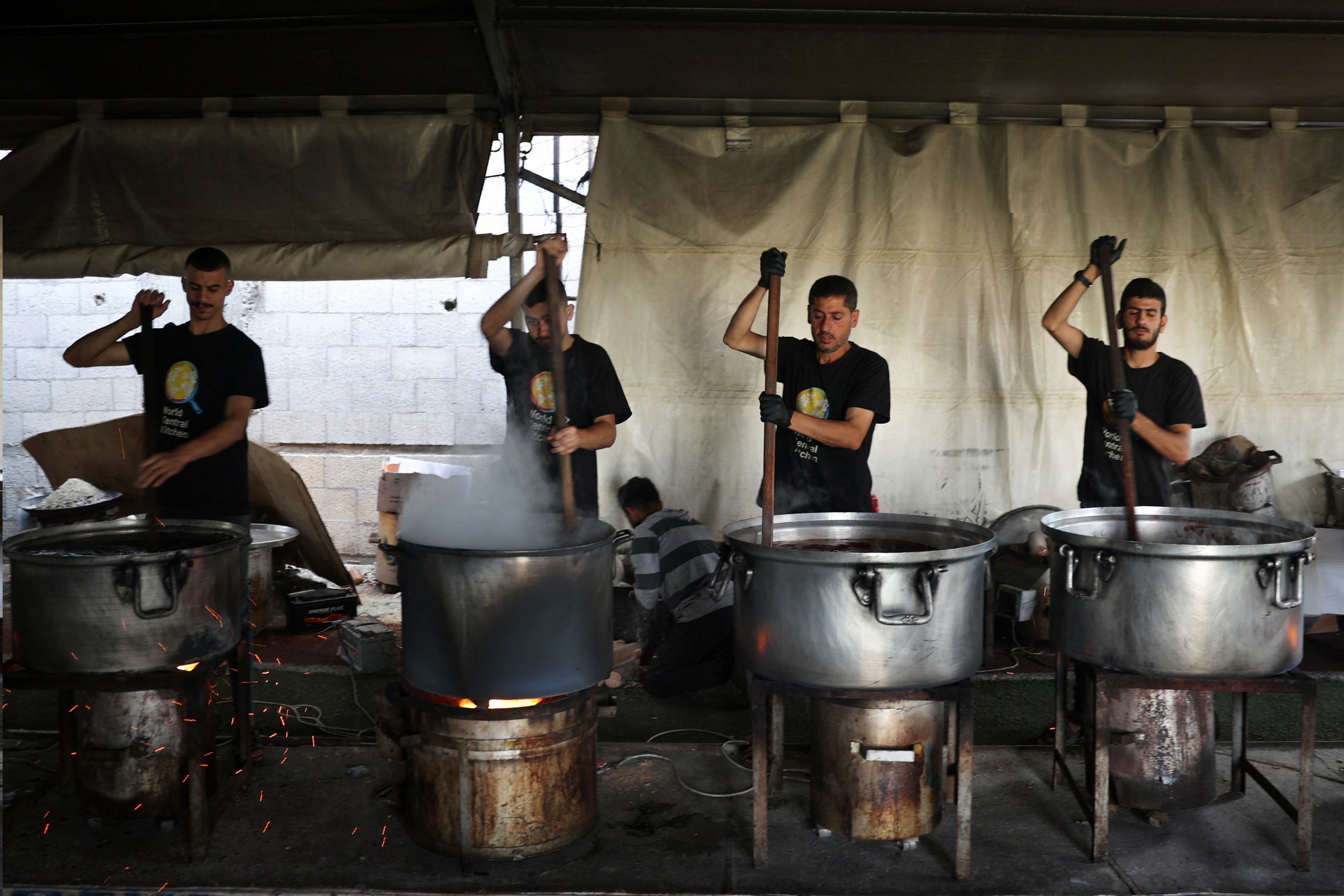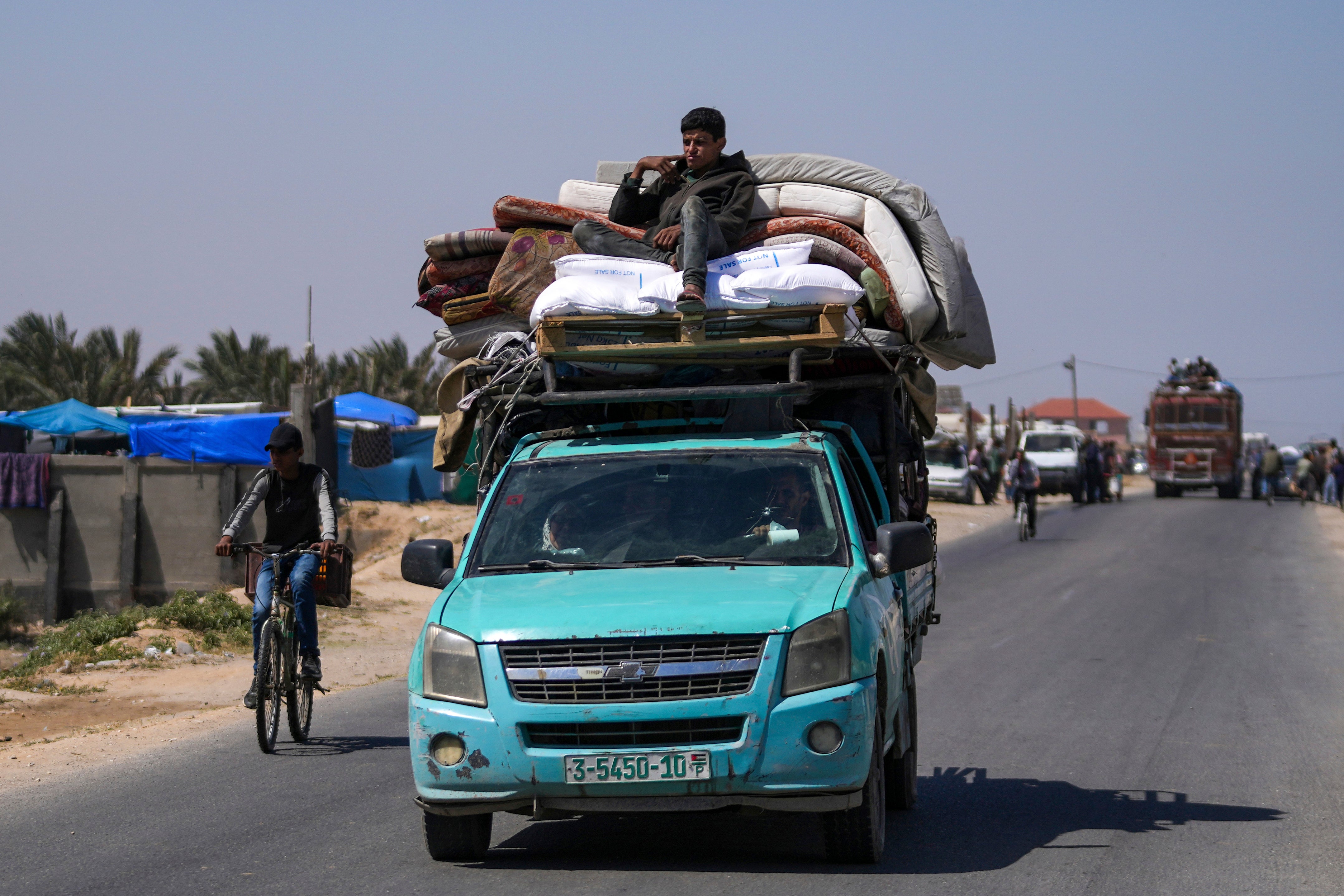Rafah’s hospitals overwhelmed while food and fuel run out as Israel steps up bombardment
Hospital staff and UN officials say the Israeli assault is piling ‘catastrophe on top of catastrophe’

The few remaining hospitals in Rafah are at 250 per cent capacity, while food and fuel are running out, the United Nations has warned, as heavy fighting between Israeli troops and Palestinian militants moves towards the centre of Gaza’s border city.
Crucial aid crossings remain inaccessible, meaning supplies of food, medicines, tents and blankets are dwindling. The World Food Programme will run out of food for distribution in southern Gaza by Saturday and there are no tents, blankets or bedding to set up new locations for displaced people, said Georgios Petropoulos, an official with the UN Office for Coordination of Humanitarian Affairs in Rafah.
The World Health Organisation (WHO) told The Independent there could be just three days of fuel left to power hospitals, water supplies and sanitation. This could see hospitals shut down critical operations and bring to a halt trucks delivering aid across south and central Gaza.
The UN and other agencies have warned for weeks that an Israeli assault on Rafah – on the border with Egypt near the main aid entry points – would cripple humanitarian operations and lead to a “bloodbath”. More than 1.4 million Palestinians – half of Gaza's population – are sheltering in Rafah, most of them displaced multiple times from other parts of the strip. Israel has defended its offensive, despite facing global pressure to stand down, saying it is “vital” in its battle to eliminate Hamas.
The Israeli military said Kerem Shalom crossing was open from its side and that 200,000 litres of fuel were allowed to cross on Friday. But the UN said it was too dangerous for workers to reach the crossing on the Gaza side to retrieve the aid due to Israel’s incursion and the ensuing fighting with Hamas.
Dr Richard Brennan, of the WHO, said the fighting is crippling the healthcare system, and the response to a humanitarian crisis that in many ways is the “worst we have ever seen”.
“Right now it’s a catastrophe on top of a catastrophe, and there is a massive degradation in the hospitals,” he told The Independent.

Only a third of Gaza’s hospitals and primary healthcare facilities are still operational. In Rafah only two are working – and they are at 250 per cent bed capacity .
“The main hospital, Al-Najjar, which became a major referral centre, is now closed because it is not accessible and in the path of the fighting,” said Dr Brennan.
“It was the main hospital providing dialysis for patients – and had several hundred kidney patients relying it.”
Dr Marwan al-Hams, director of Al-Najjar hospital, said they had to evacuate the facility when they found out it was located in the middle of Israel’s “red zone and combat zone”.
He said the sick, wounded and displaced people sheltering there “panicked” – among those who had to be evacuated were renal-failure dialysis patients who were moved under bombardment.
“We have set up a field hospital in the city centre,” he told The Independent while on the move.
Another emergency doctor, who asked not to be named for security reasons, at the European Gaza Hospital, north of Rafah, said they were dealing with absolute “carnage” amid a steady flow of blast victims.
“The most distressing thing has been seeing little toddlers with massive head wounds, with skull fractures, who are absolutely distraught and distressed with the pain and suffering,” he added in a voice note to The Independent.
“They have sheer fear in their eyes from what they've been exposed to.”

The residents of Rafah are bracing themselves for a long-promised full-scale Israeli assault of the border town which was, for so long, known as the last refuge in Gaza.
Israel has launched a ferocious bombardment of Gaza and a siege in retaliation for Hamas’s bloody rampage on south Israel on 7 October – an attack during which around 1,200 people were killed and another 250 taken hostage, including children.
Since then, Palestinian health officials say Israel’s bombings have killed nearly 35,000 people, the vast majority women and children. Restrictions on aid, and the security situation has led to a manmade famine, the UN has warned, with Dr Brennan saying that potentially a quarter of all children in Gaza aged between six months to five years are experiencing acute malnutrition.
There are concerns hunger will only increase after Israeli troops captured the Gaza side of the Rafah crossing with Egypt on Tuesday, forcing it to shut down. Rafah was the main point of entry for fuel and supplies.
Hamish Young, the senior emergency coordinator in Gaza for the UN’s child agency Unicef, said they were “scraping the bottom of the barrel” for supplies.
“For five days, no fuel and virtually no humanitarian aid entered the Gaza Strip,” he added.
The WHO’s Dr Brennan said that in three decades of manning humanitarian responses he had not seen a displacement crisis like that currently in Gaza.
“I’ve been working in this field 31 years – I can tell you every one of the toughest and most experienced veterans who have stepped foot into Gaza say there are aspects of this crisis that are the worst they have ever seen,” he added.
The UN’s agency for Palestinian refugees, known as UNRWA, said more than 110,000 people have fled Rafah.
Some have erected new tents camps in the city of Khan Younis – which was half-destroyed in an earlier Israeli offensive – and the town of Deir al-Balah, where aid agencies said they had also been overwhelmed by the influx of wounded and displaced.
Those who are still in Rafah told The Independent they “do not know where to run”.
“They do not know if they should move from the west or middle area of Rafah. The areas that were not identified as safe or dangerous places, there is no space to pitch tents,” Ahmed said.
Israel’s closest ally and biggest supplier of weapons, the US, has withheld some weapons deliveries as the Biden administration says it cannot support a major Rafah invasion in the absence of what it would deem a credible plan to safeguard non-combatants.
Israeli prime minister Benjamin Netanyahu has vowed to push ahead with the controversial ground assault with or without US arms, saying “we will fight with our fingernails” if needed in a defiant statement late on Thursday. He maintains that victory in the seven-month-old conflict is impossible without taking Rafah.
In an interview on the Dr Phil Primetime show on Thursday, Mr Netanayhu said he hoped he and Joe Biden could overcome their disagreements over the Gaza war. “We often had our agreements but we’ve had our disagreements. We've been able to overcome them,” he added.
Join our commenting forum
Join thought-provoking conversations, follow other Independent readers and see their replies
Comments
Bookmark popover
Removed from bookmarks